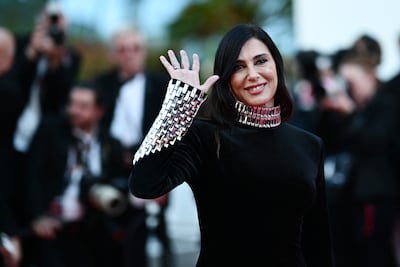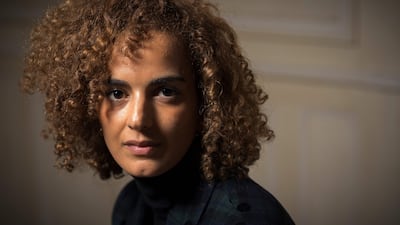For nearly eight decades, the Cannes Film Festival has rewarded cinematic excellence, inviting filmmakers, actors and industry professionals from around the globe to celebrate the medium. Among the distinguished guests who have graced the festival's panels, Arab filmmakers have played a notable role, contributing their unique perspectives and talents.
Arab representation began in 1946, with the inaugural festival. Youssef Wahbi, an Egyptian actor, director and producer, was the first Arab figure to serve on the festival's jury. Over the years, Wahbi was part of the golden age of Egyptian cinema during the 1940s and '50s. One of his final roles was in Youssef Chahine’s Alexandria … Why? in 1979 before he died in 1982.
Fast-forward to 1983 when Chahine himself joined the Cannes jury. The Egyptian filmmaker is known for his bold storytelling, providing a distinctly Arab perspective to the festival. Chahine’s film Bab Al Hadid (Cairo Station) made waves in 1958. The film starred Chahine himself alongside Hind Rostom and Farid Shawqi.

In 1991, Ferid Boughedir, a Tunisian director, joined the Cannes jury, expanding the Arab footprint at the festival. Boughedir directed Halfaouine: Child of the Terraces a year earlier and earned praise for his brave approach to taboo subjects.
In 2001, Tunisian filmmaker Moufida Tlatli became the first Arab woman to serve on the official selection jury. Tlatli's inclusion underscored the growing recognition of female Arab filmmakers and their invaluable contributions to the cinematic landscape. As well as directing films such as The Season of Men and Nadia et Sarra, Tlatli also served as editor on multiple films including The Silences of the Palace and Sejnane.
Palestinian director Elia Suleiman, who is renowned for his surreal and satirical storytelling, joined the Cannes jury in 2006. Suleiman's films explored themes of identity, displacement, and the absurdity of everyday life, offering commentary on the human condition. Suleiman’s Divine Intervention became the first Palestinian film to be nominated for the Palme d’Or in 2002.

Another historic moment came in 2007 with the inclusion of Abderrahmane Sissako, a Mauritanian filmmaker, in the Cannes jury. Sissako's films could be described as poetic realism, providing social commentary and shining a light on the struggles and triumphs of marginalised communities. In 2014, Sissako’s Timbuktu was in the running for a Palme d’Or.
In 2008, Algerian director Rachid Bouchareb joined the jury. Bouchareb's films explore themes of colonialism, immigration and identity. Days of Glory was nominated for a Palme d’Or in 2006 and he returned to compete in 2010 with Outside the Law, which was also nominated for Best Foreign Language Film at the Academy Awards.
Palestinian actress and director Hiam Abbass served on the Cannes jury in 2012. Abbass, known for her compelling performances in films such as Paradise Now and The Visitor, brought a wealth of experience and insight to the jury panel. She has appeared in many popular American television shows in recent years including the comedy Ramy and the HBO hit Succession.

Saudi Arabia filmmaker Haifaa Al Mansour became the first director from the Gulf to be a jury member at Cannes in 2015, being chosen for the Un Certain Regard category. Al Mansour’s film Wadjda received global praise for highlighting segments of Saudi society that aren’t normally showcased in media.
In 2019, Nadine Labaki added her voice to the Cannes jury. Labaki served as jury president for the Un Certain Regard category. Having directed films such as Caramel and Where Do We Go Now?, the Lebanese filmmaker became a globally recognised talent with her film Capernaum in 2018.
In 2021, a diverse array of Arab cinematic talents joined the juries, including Kaouther Ben Hania from Tunisia, Mounia Meddour from Algeria and Tahar Rahim, a French actor of Algerian descent. Rahim was on the jury for the main competition, Meddour served in the Un Certain Regard category and Ben Hania served on the Cinefondation and short films juries.

In 2022, Egyptian filmmaker Yousry Nasrallah, whose film After the Battle was nominated for the Palme d’Or in 2012, joined the jury for the short films category and Ben Hania returned to sit on the jury for Critics' Week.
In 2023, Moroccan filmmaker Maryam Touzani sat on the main competition jury a year after her film The Blue Caftan was nominated in the Un Certain Regard category. The film follows the journey of a young woman who discovers a mysterious blue caftan that unlocks hidden family secrets.
Arab participation in Cannes juries continued last year with two filmmakers being chosen for the prestigious honour. Labaki returned to serve on the main competition jury while the Un Certain Regard jury counted Moroccan filmmaker Asmae El Moudir as a member.
The latest Arab juror is French-Moroccan writer Leila Slimani. She will join South Korean filmmaker Hong Sang-soo, Indian filmmaker Payal Kapadia, American actor Jeremy Strong and French actress Juliette Binoche, the jury president, on the 2025 panel for the main competition.
Slimani has written many award-winning novels, including Dans le Jardin de l’Ogre, Chanson Douce and Le Pays des Autres. She is also French President Emmanuel Macron's representative to the Organisation Internationale de la Francophonie.

